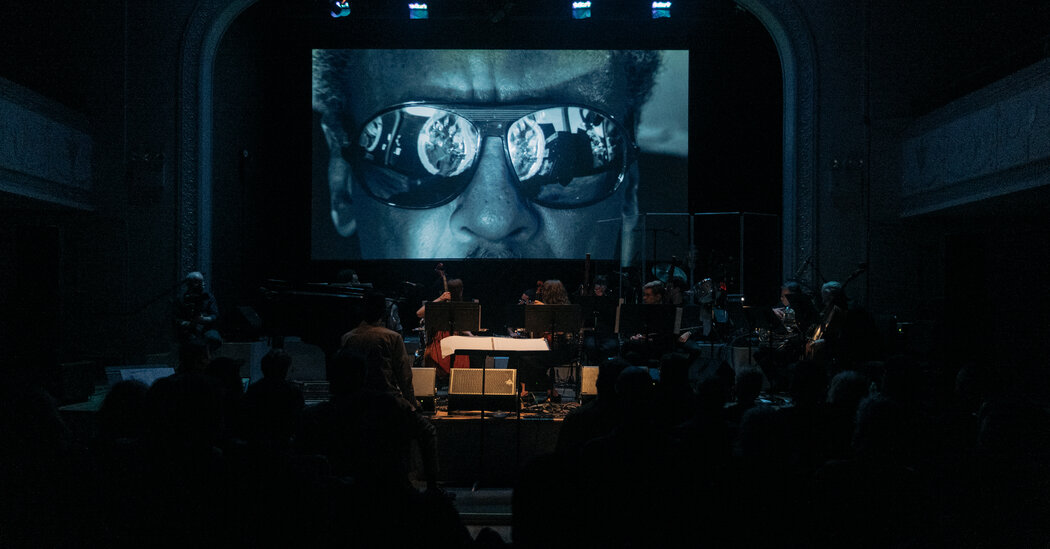
The most reductive observation I can provide about the composer and improvising multi-instrumentalist Henry Threadgill’s activity at Roulette this weekend is that he debuted some truly exciting new chamber music. Because he offered a lot more, too.
His multimedia programming stretched across Friday and Saturday, each evening running more than two hours. While the first set was titled “One” and the second — in playfully nonspecific fashion — was called “The Other One,” both contained takes on his composition “Of Valence,” for three saxophones, two bassoons, two cellos, along with a tuba, a violin, a viola, piano and percussion.
Threadgill, 78, has long deployed playfulness, ambition and unusual configurations in his work. His 1979 album “X-75 Volume 1” engaged a nonet of four basses, four winds and one vocalist.
In 2016 he won the Pulitzer Prize for music, for the double album “In for a Penny, in for a Pound,” which put the spotlight on Zooid — his late-career group that includes a tuba, acoustic guitar, cello, drums and Threadgill’s own flute and alto saxophone. Players in that ensemble improvise over quasi-serialized sequences of intervals (befitting a composer who in conversation is as likely to bring up Elliott Carter as Duke Ellington).
But this weekend’s shows were something new. The tuba player Jose Davila, the cellist Christopher Hoffman and pianist David Virelles are some of Threadgill’s closest collaborators, and capable of lending marching-band panache to his most contrapuntally complex music. Joining a larger group, their sound drew directly on the Zooid language — and some of its freer applications, as heard in Ensemble Double Up — while the multimedia cast a new light on this composer’s late style.
Those multimedia elements included collaged photographs of street debris that Threadgill took during the mass exodus from New York at the beginning of the pandemic, projected onto a screen; live recitations of prose written to accompany the images; looping, pretaped vocal choirs, with all parts voiced by Threadgill; and video essays that cut between footage of yet more chamber music and the composer’s droll sermonizing about smartphones and distraction.
Threadgill didn’t pick up an alto saxophone or a flute for live performance, though the video did feature him on bass flute. His instrumental contributions were limited to a pair of brief piano-plus-vocal moments, which were affecting in their vulnerability but a touch too tentative to come across as secure. (His pretaped choirs were more vocally assured.)
Otherwise, he focused on conducting the 12-player ensemble. On Saturday, they sounded as though in lock-step with his every surprise rhythmic feint — producing an obliquely danceable, straightforwardly joyous Threadgillian energy.
At one juncture, in the second hour of both nights, a string trio of the cellist Mariel Roberts, the violist Stephanie Griffin and the violinist Sara Caswell played staggered lines that seemed to tease traceable canonic patterning, but which remained melodically and rhythmically independent. It was tightly plotted, and resisted easy parsing; yet it didn’t sound much like Zooid’s zigzagging interplay.
A new sheen came from electronically manipulated cymbal tones, courtesy of the drummer Craig Weinrib. (The transducers he used to manipulate those metallic timbres were a tribute to the late percussionist Milford Graves, to whom the music was dedicated. The performances as a whole were dedicated to the pioneering critic and musician Greg Tate, who died last year.)
These droning metallic timbres stood in subtle, ghostly contrast to the vibrato sound production of the string trio. Next, the tenor saxophonist Peyton Pleninger developed a solo from downward-plunging motifs in the strings. As he built up a frenetic, improvisatory energy from melodic cells, the string players began treading into extended technique, with scraping, at-the-bridge bowing and lightly plucked pizzicato.
Alongside Weinrib at his drum kit, some crying alto sax figures from Noah Becker inspired beautiful portamento lines from Griffin’s viola, as well as the entry of both bassoonists playing brooding long tones at first, before turning to peppery, explosive bursts. The gradual swelling of instrumental forces continued; on Saturday, this section contained a galvanic sense of swing, even through Threadgill’s successive, minute changes in tempo.
Sometimes, when you wanted the groove to keep going, a quickly arcing exclamation from the ensemble and surprise jolt in the rhythm would bring everything to a dramatic, unexpected finish — at which point Threadgill would, for example, go back to reciting sections of his prose against projections of paintings by his daughter, Nhumi Threadgill. Or he would sit near the stage while some video played, showing Henry Threadgill moving various talismans around a horizontally resting mirror. In tandem, a voice-over track delivered the composer’s observations about contemporary life.
If Threadgill’s spoken or sung texts stopped short of narrative, they were by turns gripping or humorous as cultural criticism. One laugh-out-loud video involved him recalling both his and a barista’s annoyance at a coffee house customer who, immersed in texting, couldn’t manage to get out an order.
But while the audience was invited to join the composer in grouchy irritation, this wasn’t the sole purpose of the vignette. Instead, this morsel harmonized thematically with Threadgill’s broader concerns about what we throw away too easily, including our attention. When his spoken text referred to rat populations and their proximity to outdoor diners, his pretaped vocal choir started to chant about something “crawling up my leg.” Such lighthearted moments had a way of balancing out the text’s more serious attributes — not least about the nature of inequality in New York, before and during the pandemic.
While the precise placement of videos and spoken texts changed from night to night, the musical sequence was largely the same. The advantage of Saturday’s set was its increased tightness — in the ensemble as well as in the multimedia transitions. If some form of this vibrant chamber orchestra music makes it to a recording, it should be accompanied by documentation of the experience in the hall (similar to the way a studio recording of Anthony Braxton’s opera “Trillium J” contained a video of its semistaged premiere, also at Roulette).
“Of Valence” occasionally approached being too much to take in during a single sitting, so it was good that Roulette booked the show for two nights. This longstanding, farseeing venue in Brooklyn is the only place in the city with the chops to pull off a crisp presentation of Threadgill’s multimedia, as well as the willingness to let this composer go for it all.
Henry Threadgill
Performed on Friday and Saturday at Roulette, Brooklyn.




